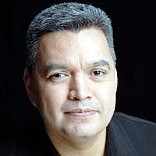RUSSELL WALLACE
 Russell Wallace is an award-winning composer, producer and traditional singer from the Stʼatʼimc and Lil’wat Nation. Wallace learned about traditional singing from his mom Flora Wallace from Xaxlip/Lil’wat. His music can be heard on soundtracks for film, television and theatre/dance productions across Canada and the U.S. Wallace received a Leo Award for best music for a documentary for his work on “1491” the TV series and received the Lieutenant Governor’s Art and Music Award in 2022 for artists who have demonstrated exceptional leadership, creativity, community engagement, and commitment through fostering and mentoring others in the fields of Visual Arts, Music or Performance.
Russell Wallace is an award-winning composer, producer and traditional singer from the Stʼatʼimc and Lil’wat Nation. Wallace learned about traditional singing from his mom Flora Wallace from Xaxlip/Lil’wat. His music can be heard on soundtracks for film, television and theatre/dance productions across Canada and the U.S. Wallace received a Leo Award for best music for a documentary for his work on “1491” the TV series and received the Lieutenant Governor’s Art and Music Award in 2022 for artists who have demonstrated exceptional leadership, creativity, community engagement, and commitment through fostering and mentoring others in the fields of Visual Arts, Music or Performance.
Wallace’s music has been performed internationally and was featured at Biennale Arte 2022-The 59th International Art Exhibition in Venice. He works with many choirs in Vancouver and has been the Director of Indigenous Vocal Ensemble at Vancouver Community College.
The Gift
by Russell Wallace
SATB a cappella – CP 1247 – duration 3:15
TBB a cappella – CP 1519
Simple yet powerful, authentic and moving: these words describe Russell’s wonderful celebration chant.
Forgotten Warriors
by Russell Wallace: arr. Sam Dabrusin
SATB a cappella – CP 2318 – duration 4:25 ![]()
Russell Wallace created this song’s melody for the film “Forgotten Warriors” (Loretta Todd, National Film Board, 1996, available on the internet). The song recalls the freely-sung traditional First Nations music, which sometimes has a strong rhythmic pulse and at other times enjoys rhythmic freedom. Russell Wallace and Sam Dabrusin (member of VCS) collaborated on this arrangement for VCS.
Prayer Song
by Russell Wallace
SATB a cappella – CP 2353 – duration 3:00
“Prayer Song” was a collaborative composition by the three elders named as composers (all three have now passed on). Russell Wallace’s mother, Flora Wallace, provided the St’at’imc lyrics. Reduplication in the St’at’imc language is when a word is immediately repeated after saying it once. So a word like “Xa”, which means ‘high’, when it is immediately repeated, the meaning becomes magnified (“Xa’xa” = ‘the highest’).

